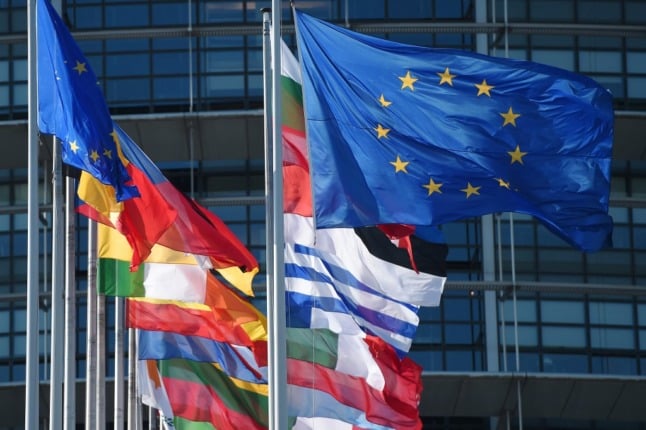1. Romania and Bulgaria join (partially) the Schengen area
From March 31st, the EU’s free movement area expands as Romania and Bulgaria will join, at least partially, the Schengen zone. There will be no longer controls between Bulgaria and Romania and the other Schengen countries, but that will concern initially only air and maritime borders. The lifting of land border controls will be decided later in the year.
READ ALSO: ‘Air Schengen’: Austria open to compromise over Bulgaria and Romania
2. The European Parliamentary elections
From June 6th to June 9th, EU citizens will go to the polls to elect the 720 members of the European Parliament.
It will be the first European elections without the UK, which still participated in 2019 even though British MEPs remained in the job only for a few months, until the country withdrew from the EU. Elected every five years, the European Parliament makes laws that apply across the EU in a number of areas, including citizens’ rights, the environment and consumer protection. It does so together with the Council, which represents EU governments.
Currently, the conservative European People’s Party (EPP), the social-democrats (S&D) and the liberals of Renew Europe hold the parliamentary majority. A surge or right-wing and far-right parties Is expected in the next parliament, but it remains to be seen whether that will change the political balance.
3. New European Commission
Back to the political agenda, based on the results of the European Parliament election, EU governments will nominate a new president of the European Commission, who will have to be approved (or vetoed) by the Parliament.
Incumbent Ursula von der Leyen has high chances to be remain in the role for another 5 years, according to experts in Brussels.
But challengers may emerge from behind the scenes. The post of European Council President is also up for grabs this year.
Current President Charles Michel (Belgium) has announced he will run for a seat in the European Parliament. If he is elected, he will have to resign from his current post in advance and will be replaced ad interim by the holder of the rotating EU Council Presidency, in this case Hungary’s Prime Minister Viktor Orbán.
4. Hungary’s EU Council Presidency
That is already causing headaches in Brussels.
From July 1st to December 31st Hungary will have the rotating EU Council Presidency.
The Council gathers representatives of EU governments. All EU countries, in turn, take the presidency for six months. The role of the presidency is to chair meetings at all levels, take legislation forward and ensure cooperation among EU member states. “To do this, the presidency must act as an honest and neutral broker,” says the Council website. This year for the first time an openly eurosceptic and pro-Russia government will take on this role.
5. The new Entry/Exit System or non-EU arrivals
After years of delays, the new EU digital border system is scheduled to be launched on October 6th. The start date has been put back several times so we won’t be too surprised if it’s delayed again, especially given the concerns held by travel companies.
The EU Entry/Exit System (EES) will register non-EU citizens each time they cross the external borders of the Schengen Area, by air, land or sea.
The EES will replace the manual stamping of passports with an electronic record of entries and exits. It will register the person’s name, type of travel document, fingerprints and facial images and the date and place of arrival and departure. As people will have to be registered for the first time in front of a border guard, there are concerns the introduction of the scheme will cause major queues at the UK border crossings, in Dover, at the Eurotunnel and at St. Pancras station.
READ ALSO: EES and ETIAS – What are the big changes coming for travel in Europe?
6. The common charger
As regards consumer affairs, by the end of the year all mobile phones, tablets and cameras sold in the EU that are chargeable by cable will have to be have a USB Type-C charging port, so consumers will no longer need a different charger every time they purchase a new device.
The decision was made last year to avoid the multiplication of cables and therefore masses of electronic waste. It is estimated consumers will save up to 250 million euro a year on unnecessary charger purchases.
From spring 2026, the obligation will extend to all laptops.
7. The long-term residence of third country nationals
With all changes this year, what is happening to the revision of the directive aimed at making it easier for non-EU citizens to move around EU countries?
Under a 2003 directive, third-country nationals can in theory acquire EU-wide long-term resident status if they have lived ‘legally’ in an EU country for at least five years.
But that doesn’t work so easily in practice. In 2022 the European Commission proposed to review and simplify these rules. The European Parliament and Council are now negotiating on the final content of the law. It is not clear whether talks will be concluded before the European elections.
If the new law is not passed by spring, it will be postponed to the next parliament, therefore probably until autumn or to 2025.
READ ALSO: EU countries settle on rules for how non-EU citizens could move around Europe



 Please whitelist us to continue reading.
Please whitelist us to continue reading.
Member comments